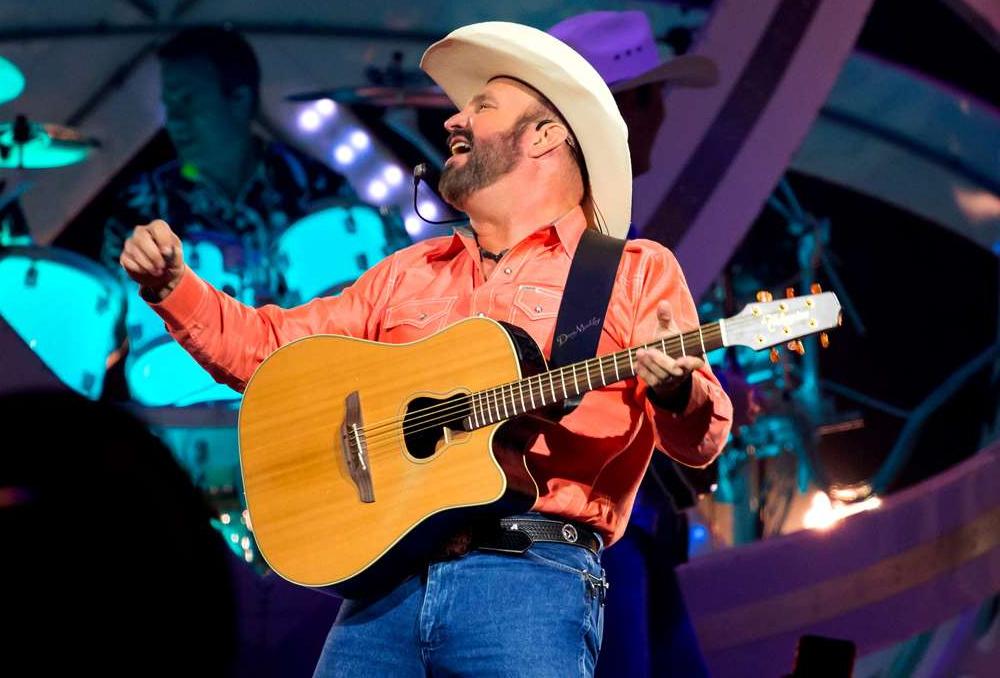Is Garth Brooks’ Tour the Biggest Ever by a Solo Artist?
Garth Brooks’ three-year tour of North America, now wrapping its eighth (!) leg with a seven-show run at Nashville’s Bridgestone Arena, is historic, even revolutionary.

Jason Squires / JasonSquires.com – Garth Brooks
Garth Brooks plays the first of five shows at the Sprint Center in Kansas City, Mo., May 5.
Since coming out of retirement a little over three years ago, Brooks has significantly impacted the live music industry in the way on-sales are announced and conducted, the way the secondary market is dealt with, and the sheer volume of tickets sold.
When one considers the backstory of Brooks’ return to the road, the accomplishments of the last three years would seem unlikely to those not versed in the work ethic of Brooks and the passion of his fans.
To say that demand was high when Brooks emerged in July of 2014 from a 13-year hiatus to announce a new album (Man Against Machine) would be a huge understatement. In anticipation of the sheer deluge of ticket-buyers, Brooks (with Ticketmaster) changed the way high-demand tours are executed. Rather than putting scores of dates on sale at once, Brooks put each city up individually, announcing two or three shows and then adding dates in real time as demand dictated.
And demand certainly dictated, resulting in mini-residencies at arenas across the country, with anywhere from five to 11 shows in most markets, often two performances in one day.
Brooks solved the scaling conundrum by pricing all tickets the same (about $70), maintaining that he never wanted price to be a roadblock for anyone to see him live. To take the secondary market out of the equation and prevent resellers from selling tickets at quadruple face value, Brooks simply sold tickets until demand was met.
When everybody who wants a ticket has purchased one, the secondary market becomes a moot point. Brooks and his team worked their way through this issue. (Obviously, a secondary market existed on the tour, but at a fraction of the volume that would exist had Brooks been content to play, say, doubles or triples in major markets).
Since the tour began, local press from coast to coast has touted the shattering of building and market records. And with those records and glowing reviews, Brooks, a quiet philanthropist of uncommon generosity, has left a trail of positivity in his wake through behind-the-scenes acts of benevolence as the massive tour spread good will across the continent.
As the year and Brooks’ North American tour move toward their respective conclusions, one wonders how history will view this remarkable run.

Courtesy Honda Center – Garth Brooks
Honda Center, Anaheim, Calif.
As a guy who has covered live music for over 30 years, I can tell you that I’ve never seen anything remotely like it.
Surely, Brooks has generated revenue, and especially ticket sales, at levels few artists in history can claim. But, will history view Brooks’ efforts of the past three years on the same level as such global blockbusters as the Rolling Stones’ Voodoo Lounge tour of 1994-95, the Bigger Bang tour a decade later, or the reigning “king of all tours,” U2’s 360 tour of 2009-’11, which tour trackers, including Pollstar, credit with 7.3 million tickets sold?
The Brooks tour is unquestionably in that company. Brooks’ camp, which has announced sales figures in press releases since the tour began, claims 6.4 million tickets sold, and I have absolutely no reason to doubt them.
For one thing, the Brooks tour’s promoter, Ben Farrell (an intensely private industry legend with a history that dates back to Elvis Presley), could tell you—“strictly confidentially,” of course—the exact ticket count for an Alan Jackson show in the fall of 1992.
When it comes to show counts, Farrell is known for not exaggerating “one iota” (though he may have been exaggerating more than a couple of iotas when he told me about the sold-out George Strait show in Fargo, N.D., when it was “so cold fans would reach in the box office window to get their tickets and then draw back a nub.”)
But until there is a SoundScan for tickets, box office charts require box office reports, and promoters of those Stones and U2 tours referenced earlier, Michael Cohl and Arthur Fogel, respectively, faithfully reported their numbers to Pollstar.
As such, these tours are solidly etched in the granite of industry history. For his part, as is certainly his prerogative, Farrell firmly believes the artist’s business is just that: their business.
So, in terms of tickets sold, is Garth Brooks’ tour the biggest tour ever by a solo artist?
For what it’s worth, I believe that it is. Is it the biggest North American run ever? Again, I don’t see anything that would top 6.4 million tickets.
Unfortunately, though the Brooks tour is without question a mammoth achievement and one of the absolute biggest ticket sellers in history, Pollstar cannot officially bestow these designations without full box office reports from the promoter, management, the venue, the agency, or someone affiliated with each date.
As the trade paper of record for the live entertainment industry, Pollstar’s credibility is at stake, so we can’t just rely on press releases.
We hope we can one day officially record these unprecedented ticket sales for posterity. Until then, we just watch in awe and offer a hearty and well-deserved congratulations.
And we still have the rest of the world to go!
Ray Waddell is the president of Media & Conferences for OVG, Pollstar’s parent company.
 Daily Pulse
Subscribe
Daily Pulse
Subscribe

